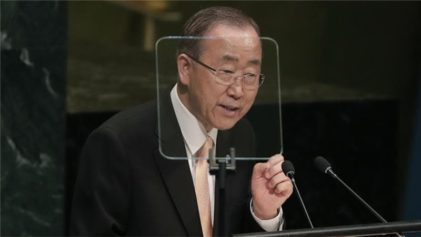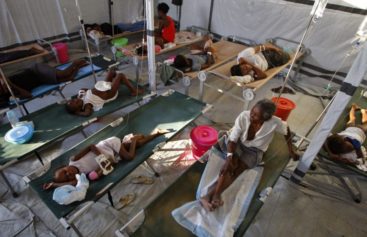French president greets troops
As the French operation in Mali extends beyond two months, Ban Ki-moon, secretary-general of the United Nations, today proposed an 11,200-strong peacekeeping force in Mali that could maintain security after the French leave.
Ban proposed that the UN force would work alongside non-UN forces to conduct major combat and counterterrorism operations.
“Although the extremists and criminal elements have been dealt a heavy blow, they continue to pose a significant threat to the safety and security of the civilian population and any United Nations personnel deployed in Mali,” the U.N. chief said in a report he gave today to the U.N. Security Council.
Ban said the option would give a combat role to the African-led force in Mali, AFISMA, which is made up of a cobbling together of troops from nearby nations such as Nigeria, Chad and Niger, and it would also expand the U.N. political mission.
It would “operate under robust rules of engagement, with a mandate to use all necessary means to address threats to the implementation of its mandate, which would include protection of civilians,” Ban said, according to Reuters.
The secretary-general said there may also be a need for a second “parallel force” that would “conduct major combat and counterterrorism operations and provide specialist support beyond the scope of the United Nations mandate and capability.”
When France last month began looking ahead to its withdrawal from Mali, Captain Samba Coulibaly, spokesman for the Mali military, said Malians shouldn’t be fearful that French ground troops are leaving.
“The departure of the French soldiers does not scare us, especially since their air force will still be present both in Timbuktu and Sevare,” he said at the time. “They control this entire zone and can intervene within a matter of minutes in order to carry out air strikes as needed.”
Even after France withdraws from the cities in the south and central regions, French Foreign Minister Laurent Fabius has said troops will continue operations to flush out militants in “some terrorist havens” in the north.
France wants to ensure that the Islamists can’t make future threats to France. Because of the nature of terrorism, even after the Islamists are routed in Mali, they only need small numbers to deliver significant damage there and beyond.
Last month, French President Francois Hollande was welcomed as a conquering hero in the former French colony. On a whirlwind one-day tour, he was greeted by jubilant Malians everywhere. Malians danced to the beat of drums, which was banned by the Islamist rebels under Sharia law.
In the famed city of Timbuktu, where insurgents had destroyed historic mausoleums, Hollande saw sport shirts with the flags of both countries, and banners reading “Thank You France.” He was presented with the gift of a camel and waded into an adoring crowd in Timbuktu, accompanied by Fabius, Defense Minister Jean-Yves Le Drian and Development Minister Pascal Canfin.
“I have just lived through the most important day of my political life,” Hollande said to the cheering crowd waving the red, white and blue colors of France and holding portraits of the president.
In Bamako, Hollande told a crowd, “Terrorism was pushed back, chased, but it hasn’t yet been vanquished. France will stay with you as long as it takes, until the time for Africans themselves to replace us. Until then, we will be beside you to the end, as far as north Mali.”
Hollande said his country would support the Malian economy and help with reconstruction of public services, education, health, security and cultural heritage.
Over the last few weeks, French troops, backed by Malian and Chadian forces, have been attacking the militants in desert and mountain hid-outs after they fled the major northern cities, including Timbuktu and Gao.
The Islamists have responded by launching guerrilla-style attacks, such as sending a suicide bomber to a checkpoint in Timbuktu last week, killing a Malian soldier.
The secretary-general rejected a request from Malians — as well as the African Union and West African regional group— for a U.N. force to undertake combat operations against armed groups. Ban said combat falls well outside the U.N. peacekeeping doctrine and peacekeepers are not trained or equipped for fighting in the deserts and mountains of northern Mali.
According to Ban, the political process in Mali is lagging “dangerously behind the military effort.” He called for a national dialogue to be convened without delay. Ban said human rights in Mali need immediate action, mentioning the reports in the north of summary executions, illegal arrests, use of children by armed groups, rape, forced marriage and the destruction and looting of property.


